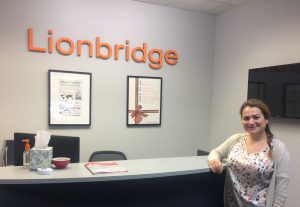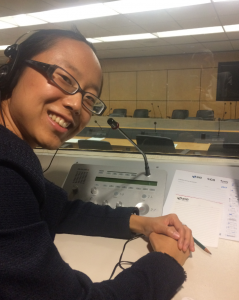Growing up in a multicultural environment, Gaya Saghatelyan has always been passionate about languages and culture. She spoke Russian, Armenian and English at home. In college, Gaya studied Business Administration at a French business school. Between college and MIIS, Gaya worked for a software company in Marketing. She is now a Project Manager at Lionbridge, the largest language services provider in the world.
*How did you find your job/internship?
I began my journey at Lionbridge as a Sales and Marketing Intern on the IT/High-Tech team. I first learned about the opportunity through an employer information session organized by the MIIS Center for Advising and Career Services office (CACS). When I found out that the internship would give me the opportunity to work with Allison McDougall, VP of Emerging Business and an MIIS alumna, I knew it would be a great learning experience.
Coincidentally, I had met Allison the year before when she presented on an employer panel organized by Winnie Heh, my Career Advisor. At the time, I was helping Winnie organize the event and had the opportunity to network with the panelists. Through getting to know Allison and her work at Lionbridge, I knew I wanted to be a part of it.
As an intern, I learned a lot about the industry and Lionbridge’s business and met a lot of interesting people. I eventually wanted to transition into a role in operations, and Allison was extremely supportive in helping me explore opportunities at Lionbridge. She introduced me to a lot of key people and encouraged me to share what I had learned at MIIS with the management team. This was an extremely valuable experience, as I got to apply what I had learned and see how this knowledge plays into the company’s strategy.
Upon graduation, I was offered a full-time position on the Project Management team. I am extremely grateful to CACS for establishing this key partnership with Lionbridge and to Allison for spearheading it.
*What experiences at MIIS helped (career management course, career fair, individual career advice, the MIIS network, coursework, class project, immersive learning experiences)?
As you can see from my personal story, connecting with people played a key role in my career. Winnie Heh, Lee Desser, Bryce Craft and Emily Weidner all put a tremendous amount of effort into organizing useful TILM career events so that we can connect with the industry. In addition, our professors, Max Troyer and Adam Wooten, encouraged us to attend industry events such as IMUG and Women in Localization. These events were a great way to enhance the classroom experience and I continue to attend them as a working professional.
I was also delighted to see that the knowledge we gained in our program is highly applicable to the real world. For example, I often use the documentation and file management best practices we learned in Max Troyer’s Project Management class, as well the marketing tools covered in Adam Wooten’s International Marketing class. I even had the chance to present some of my class projects to my colleagues at Lionbridge.
*What advice would you share with MIIS students?
- Keep learning. Learn as much as possible about your industry while you’re at MIIS. It may seem overwhelming or theoretical, but you will take that knowledge with you and make yourself an invaluable asset.
- Explore different roles. Don’t limit yourself to only one specialization, because there are so many opportunities out there. Be open-minded about taking on new roles.
- Connect with people. It’s a small industry, make genuine connections with people and help your colleagues. Networking is not about pushing your agenda, it’s about learning from others.
Finally, always remember, you are in one of the best programs in the country, if not the world. Your skills are in demand.
Winnie Heh
Career Advisor
wheh@miis.edu



